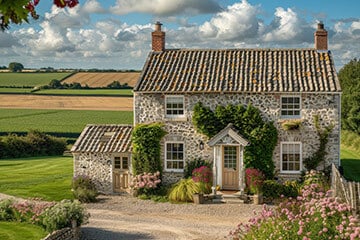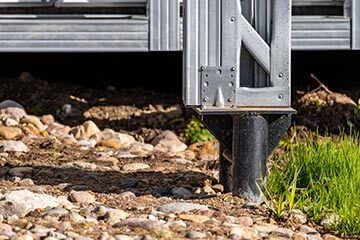If you use a commercial property, it's important to protect it.
If something goes wrong, it's up to you to fix any damages to your property's structure. This could put your business at risk too. And if you're a commercial landlord, this might mean you lose your source of income.
Commercial property insurance can help you cover the cost of these damages. We don't compare commercial property insurance, but we'll explain why it's important

What is commercial property insurance?
Commercial property insurance is a type of buildings insurance policy.
It's designed for owners of buildings that operate as commercial premises, for example shops, cafés, offices or industrial buildings. You can get commercial property insurance if you let the property to a business or run your own from it.
If you're a landlord, there are specific commercial landlord insurance policies, which cover the building from fire, theft and damage.
Who needs commercial property insurance?
Commercial property insurance is important for anyone who owns or is responsible for a business premises. It helps protect the building itself - and your income - if something unexpected happens.
You'll likely need this type of cover if:
- You own your business premises - for example a shop, cafe, office or warehouse that you run your business from.
- You're a landlordletting out commercial units to other businesses
- Your building is central to your operations - like a factory floor, a restaurant kitchen, or a retail stockroom.
Without insurance, the cost of repairing serious damage caused by fire, flooding or vandalism could be devastating. Having a policy in place means your property, and the business activities that depend on it, are protected.
Is commercial property insurance a legal requirement?
No, you're not legally required to have commercial property insurance.
That said, going with it can leave you exposed to significant costs if something happens to the buildings. Fires, flooding or vandalism could cause damage that's expensive to repair, and without cover those costs would fall entirely on you.
So while the law doesn't make it compulsory, many landlords and business owners choose to buy it as a way of protecting both the property and their income if the worst happens.
What does commercial property insurance cover?
Commercial property insurance covers the costs associated with repairing and rebuilding your property.
It covers the bricks and mortar as well as fixtures and fittings against:
- Fire
- Burst pipes
- Flood damage
- Storm damage
- Riot damage
- Theft
You could pay for add-ons such as cover for subsidence and business interruption too, but sometimes they're included as standard.
Public liability cover is another extra you might be able to add. This protects you if your:
- Business premises causes injury to other people
- Any of the activities held in the premises cause injury to other people
- Damage to property
What does commercial property insurance not cover?
As with all home insurance policies there are exclusions. These could include:
- Premises that are left unoccupied for longer than a certain period, such as 30 days
- Theft where access isn’t gained by force
- Wear and tear
- The contents of your premises (unless you've taken out additional contents insurance)
- Excess costs
Make sure to read your policy documents carefully to find out exactly what isn’t covered and the conditions of the insurance.
What about unoccupied commercial property insurance?
Empty buildings carry extra risks - from vandalism and squatting to burst pipes going unnoticed. Because of this, most standard commercial property policies only cover a property for a limited time if it's left unoccupied (often around 30 days).
To stay covered beyond that, you'll usually need a specialist unoccupied property policy - but these policies often come with conditions. For example, carrying out regular inspections, draining the water system or turning off utilities to reduce the risk of damage.
What’s the difference between commercial property insurance and business buildings insurance?
Commercial property insurance and business buildings insurance are very similar. The key difference is in what they protect:
- Business buildings insurance usually covers the premises you own and operate your business from.
- Commercial property insurance often applies when you let the building out to another business.
So while the policies overlap, which one you need depends on whether you're the occupier or the landlord.
How much is commercial property insurance?
There's no set cost - it depends on the property and how it's used. Insurers will look at factors like:
- The type, size and age of the building
- The location and any local risks (like flooding)
- How the building is used day to day
- The level of cover you choose.
Because of these variables, it's best to compare quotes so you know what to expect for your specific situation.
What other business insurance do I need?
Commercial property insurance covers only the structure and fittings – not the contents of your premises.
So to cover your belongings in the building, such as machinery, computers, office furniture or stock, you could look at taking out business contents insurance.
It can sometimes be taken out in one policy with commercial buildings insurance. But it’s worth comparing the cost of a combined policy as well as two separate policies to make sure you’re getting the best deal.
Even with property you rent out, you might want to consider taking out commercial landlord contents cover if there are any of your own contents inside (although the tenant is responsible for insuring their own contents).
As mentioned above, check to see if your commercial property insurance includes cover for business interruption. This would give you some financial respite if a problem with the building meant you were unable to trade for a period.
If you’re not covered, you might be able to take out a standalone business interruption policy.
Public liability cover, meanwhile offers you protection if your business premises or activities cause injury to other people or damage to their property.
By law, you need to take out employers’ liability insurance as soon as you have any employees. This can help provide compensation if any member of staff gets injured or falls ill as a result of the work they do for you. You can be hit with a hefty daily fine if you haven't got this cover.







